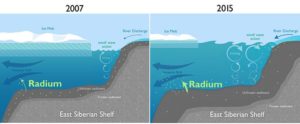
Credit: Woods Hole Oceanographic Institute
The planet’s climate is incredibly complex, and scientists are still discovering the effects and consequences of a warming planet – such as a new study finding drastic changes in the chemistry of the ocean waters surrounding the Arctic.
Researchers working near the middle of the Arctic Ocean have found that levels of radium-228 have shot up rapidly over the last decade, as vanishing ice leads to more sediment getting swept up into the water.
Not only does it show how far-reaching and complicated the effects of global warming can be, this could have significant consequences for marine life and the Arctic food chain, according to the researchers, led by a team from the Woods Hole Oceanographic Institution in Massachusetts.
“We suggest that significant changes in the nutrient, carbon, and trace metal balances of the Arctic Ocean are underway, with the potential to affect biological productivity and species assemblages in Arctic surface waters,” write the researchers in their paper.
Radium-228 has long been used to work out the flow of land and sediment into the sea – it’s […]











The Arctic is ice-free during Ice Ages. The ice cap moves to Canada and North America (east of the Rockies) due to the Milankovitch Cycles. The West Coast of North America and Canada stays relatively warm due to the moderating influence of the Pacific Ocean.
Please Sam could you give me a link/reference/reseach that indicates how you know this is true.